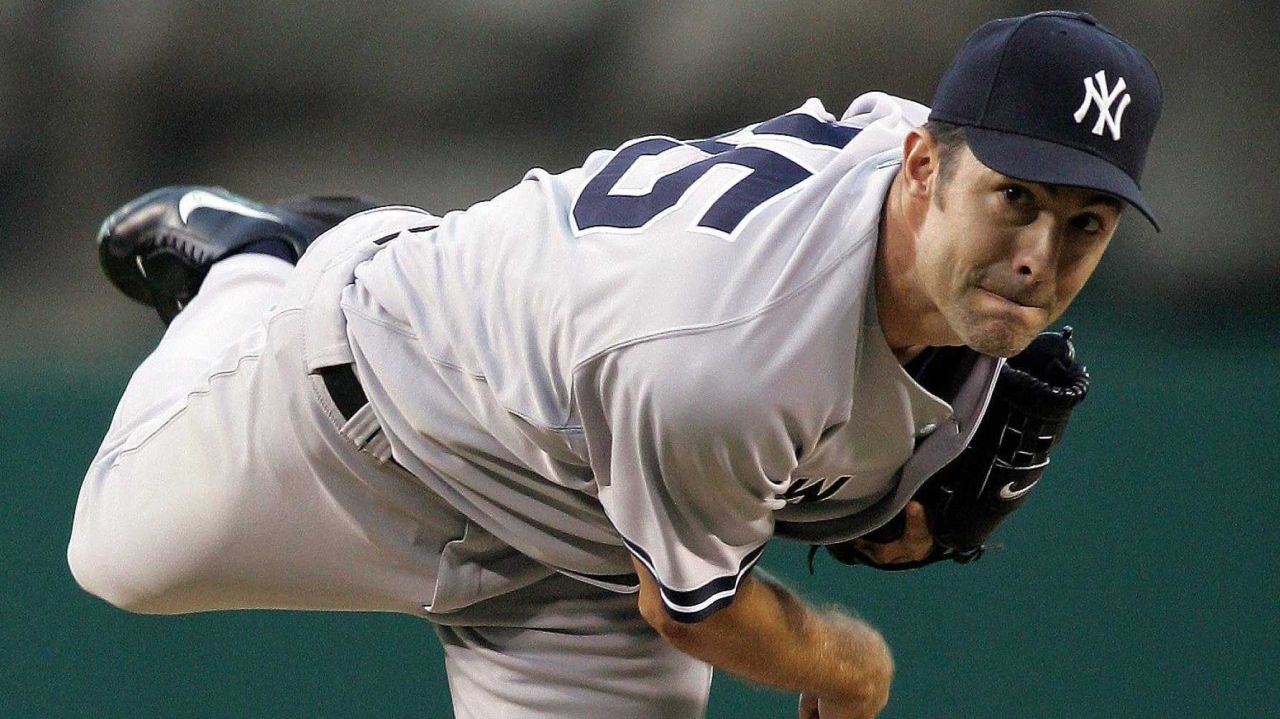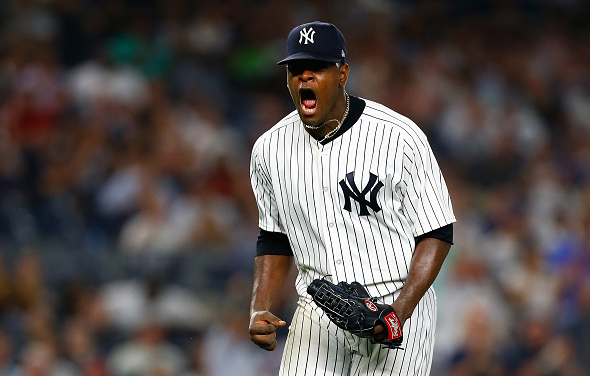
Updated Post: Tuesday, Jan. 23, 3:59 p.m. — According to Hall of Fame voting tracker Ryan Thibodaux, 221 public ballots (plus four anonymous) from members of the Baseball Writers Association of America (BBWAA) have been submitted, and Mike Mussina has appeared on 70.7-percent of them. One week ago, on Jan. 16, the 270-game winner had been checked off on 72.7-percent of ballots (187 total at the time).
For Hall of Fame enshrinement, a candidate must receive votes on 75-percent of the ballots. Thibodaux estimates that these 225 ballots are 53.1-percent of known ballots, which means there are a projected 424 ballots altogether. If this number is accurate, Mussina would have to appear on 79.9-percent of the remaining ballots to make the Hall. Currently, he has received 159 votes, and he would need an additional 159 votes to eclipse the election threshold.
Voting results also note that 8.80 names have been voted for on average.
Nathaniel Rakich, who also tracks Hall of Fame votes, projects that Mussina will finish with a final vote of 62.8-percent (54.7-percent estimated on private ballots). Based on Rakich’s projections, Chipper Jones (98.2-percent), Vladimir Guerrero (93.8-percent), Jim Thome (93.2-percent), and Trevor Hoffman (80.4-percent) would be a part of this year’s Hall of Fame class.
Results will officially be announced tomorrow, Jan. 24, by the BBWAA.
Update: Tuesday, Jan. 16, 4:05 p.m. — According to Hall of Fame voting tracker Ryan Thibodaux, 183 public ballots (plus four anonymous) from members of the Baseball Writers Association of America (BBWAA) have been submitted, and Mike Mussina has appeared on 72.7-percent of them. One week ago, on Jan. 9, the 270-game winner had been checked off on 72.9-percent of ballots (177 total at the time).
For Hall of Fame enshrinement, a candidate must receive votes on 75-percent of the ballots. Thibodaux estimates that these 187 ballots are 44.1-percent of known ballots, which means there are a projected 424 ballots altogether. If this number is accurate, Mussina would have to appear on 76.8-percent of the remaining ballots to make the Hall. Currently, he has received 136 votes, and he would need an additional 182 votes to eclipse the election threshold.
Voting results also note that 8.91 names have been voted for on average.
Nathaniel Rakich, who also tracks Hall of Fame votes, projects that Mussina will finish with a final vote of 64.6-percent.
This year’s Hall of Fame class will officially be announced on Wednesday, Jan. 24, by the BBWAA.
Update: Tuesday, Jan. 9, 2:05 p.m. — According to Hall of Fame voting tracker Ryan Thibodaux, 173 public ballots (plus four anonymous) from members of the Baseball Writers Association of America (BBWAA) have been submitted, and Mike Mussina has appeared on 72.9-percent of them. One week ago, on Jan. 2, the 270-game winner had been checked off on 73.1-percent of ballots (156 total at the time).
For Hall of Fame enshrinement, a candidate must receive votes on 75-percent of the ballots. Thibodaux estimates that these 177 ballots are 41.7-percent of known ballots, which means there are a projected 424 ballots altogether. If this number is accurate, Mussina would have to appear on 76.5-percent of the remaining ballots to make the Hall. Currently, he has received 129 votes, and he would need an additional 189 votes to eclipse the election threshold.
Voting results also note that 8.89 names have been voted for on average.
This year’s Hall of Fame class will officially be announced on Jan. 24 by the BBWAA.
Update: Tuesday, Jan. 2, 1:30 p.m. — With over one-third of public ballots submitted, Mike Mussina has inched slightly closer to Cooperstown.
According to Hall of Fame voting tracker Ryan Thibodaux, 152 public ballots (plus four anonymous) from members of the Baseball Writers Association of America (BBWAA) have been submitted, and Mussina has appeared on 73.1-percent of them. One week ago, on Dec. 26, Mussina had been checked off on 70.8-percent of ballots (106 total at the time).
For Hall of Fame enshrinement, a candidate must receive votes on 75-percent of the ballots. Thibodaux estimates that these 156 ballots are 36.8-percent of known ballots, which means there are a projected 424 ballots altogether. If this number is accurate, Mussina would have to appear on 76.1-percent of the remaining ballots to make the Hall. Currently, the 270-game winner has received 114 votes, and he would need 204 more votes to eclipse the election threshold.
Voting results also note that 9.00 names have been voted for on average.
This year’s Hall of Fame class will officially be announced on Jan. 24 by the BBWAA.
Orginal Post: Tuesday, Dec. 26, 2:41 p.m. — For a fifth consecutive winter, No. 35 is hoping to reach the magic number of 75.
Mike “Moose” Mussina, who played 18 seasons as a starting pitcher for the Yankees and Baltimore Orioles during the peak of baseball’s “steroid era”, is once again in the running for a permanent plaque in Cooperstown, N.Y. at the Baseball Hall of Fame.
According to Hall of Fame voting tracker Ryan Thibodaux, 106 public ballots submitted by the Baseball Writers Association of America (BBWAA) have been made public, and thus far, Mussina has been checked off on 70.8-percent of those ballots. To make the Hall of Fame, a candidate must receive votes on 75-percent of the ballots for election.
Of those 106 public ballots (three listed as anonymous), Thibodaux estimates that these are 25.5-percent of known ballots, which means he expects a total of 416 ballots to be submitted before results are officially announced on Jan. 24 by the BBWAA. These early voting results also note that 9.01 names have been voted for on average, and the most inductees the BBWAA has ever voted in is five (back in 1936, the Hall of Fame’s inaugural class).
As for Mussina, who received 51.8-percent of the vote last winter, Thibodaux projects that the 270-game winner will need to appear on 76.5-percent of the remaining ballots to make the Hall. This means that Mussina would need 237 more votes added to his current mark of 75 to eclipse the election threshold next month. In 2017, Mussina missed the Hall by 103 votes, but his name will remain on the ballot until 2023.
THE CASE FOR MUSSINA
Mussina, 49, retired from baseball in 2008 after seven Gold Glove awards and five All-Star Game appearances over his 18 year career. According to Baseball-Reference, Mussina’s 82.7 WAR is 24th all-time for pitchers. In ERA-plus (123), he ranks higher than Don Drysdale, Warren Spahn, Steve Carlton, and several other Hall of Famers.
It’s evident that Mussina has yet to pass the “eye test” — a simple glance at common statistics that shape a career. But another exercise that’s popular is comparing him to an actual Hall of Famer. In this case, Mussina’s numbers are quite similar to Jim Palmer’s, as both pitchers finished with identical winning percentages (.638). Mussina also earned 601 more strikeouts than Palmer, and his ERA (3.68) was only .82 higher.
Since Mussina became eligible for the Hall of Fame in 2013, five starting pitchers — Tom Glavine, Randy Johnson, Greg Maddux, John Smoltz, and Pedro Martinez — have taken part in induction ceremonies. Three of those Hall of Famers achieved 300 wins, while two collected Cy Young awards and World Series rings.
“I pitched in an era where there were a lot of good pitchers who lasted a long time,” Mussina told WFAN’s Sweeny Murti last January. “Not just good pitchers for eight or 10 years, these guys were good pitchers for 18 or 20 years. And I feel fortunate that I was able to play with them and compete with them and have the success — or near the success — they had.
“I got to win 270 games and I felt tremendously fortunate to be able to do that. I don’t know when the next 270-game winner is going to be. It’s not easy.”
According to Murti, Mussina also believes that his dearth of accolades were out of his individual control. Granted, the right-hander came close to several achievements. In 2001, his first season with the Yankees, Mussina came one strike shy of a perfect game against the Red Sox at Fenway Park in Septemeber. Two months later, he was a Mariano Rivera save shy of winning the World Series in Arizona.
“I would never want to say I wish I would have gotten that perfect game, but then I only pitched 11 seasons,” Mussina said. “To play for 18 years and win 270 games is much more satisfying as I sit here at 48 years old. I would never have traded what I was able to do for one of those things to take away the ‘almost’ part. There’s a lot of stuff I did accomplish that was more than ‘almost.’ There just happen to be a handful of things that I didn’t quite get to do and that’s okay. You can’t have everything.”
If you want to connect with Tom Hanslin, email him at [email protected] or follow him on Twitter @tomhanslin.




